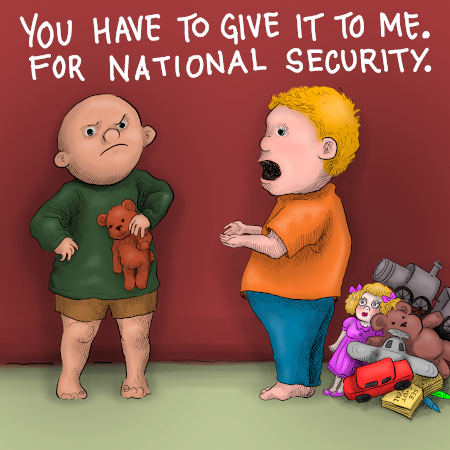The United States Congress is considering "banning" TikTok. Here are a few example headlines covering the issue, though this list is by no means exhaustive:
- NPR: "Why the House voted to ban TikTok and what could come next."
- The Verge: "How the House quietly revived the TikTok ban before most of us noticed"
- The Washington Post: "What the potential TikTok ban means, and what’s next for the bill".
- NBC: "A TikTok ban could embolden authoritarian censorship, experts warn"
If you're unfamiliar with this story, it might be worth skimming a few mainstream sources before continuing, but here's my (perhaps uncharitable) summary of the coverage: Republicans, ever-terrified of the communists constantly coming for our children, want to ban it because "China" and the youth. Those Democrats who support the bill, always more measured, simply want to "get rid of foreign control," a distinction perhaps best illustrated by this classic meme.

Many opponents of the bill note the recent flurry of articles like this one, from NBC, asking, "Is it TikTok? Here’s why some young Americans sympathize with Palestinians." These critics, like Rep. Maxwell Frost, argue that the bill would be a violation of free speech (from that NPR article):
"I think that it is a violation of people's First Amendment rights," he said. "TikTok is a place for people to express ideas. I have many small businesses [editor's note: 🙄] in my district and content creators in my district, and I think it's going to drastically impact them too."
This is a quintessential culture war setup. On the one hand, we have Republicans, along with some more measured Democrats, panicking about the children, a lack of patriotism, communists, brown people, or some combination thereof. On the other hand, we have people who care about civil liberties, in this case, freedom of speech.
But unlike most culture war setups, Republicans (and some Democrats) aren't trying to actively hurt anyone with this one. When they're panicking about trans kids ("women's sports," "women's bathrooms," ...), black people ("tough on crime,"), immigrants ("invasion at the border"), etc., they are picking real victims, and a robust political defense of those groups is necessary. But who will this hurt? ByteDance? For once, there is no hostage, meaning that we need not accept their framing.
They’ve put forward an idea that stands to anger large swaths of the public and massively encroach on ordinary Americans’ right to free speech, all while having little to no effect on US voters’ growing repugnance toward Israel’s war: banning TikTok.
Even the podcast Tech Won't Save Us, among the left's most prominent tech critics, somnambulated into the same. Their March 21 episode, after a very brief explanation as to why the bill is effectively a ban, went directly into a critique of the American political elite's perception that TikTok is manipulating the youth with scary communist algorithms, especially on issues surrounding Palestine. I agree with and fully endorse every single thing that they said about that, but who is this even for? TikTok has a billion users. Those billion people who use TikTok don't need leftist commentators to explain to them that they're not Chinese saboteurs. They obviously already know that. This is commentary for its own sake. By skipping through what I will argue should be a powerful, substantive critique of the bill from the left in the first couple minutes to focus on the culture war discussion (and, in the second half of the episode, on the geopolitics of TikTok, which I found slightly more substantive), the episode is emblematic of the left's weak messaging and needlessly defensive posture.
The "ban" is only a ban in that it would give ByteDance, the Chinese company that owns TikTok, six months to divest (sell its shares to an American), or the app will be banned from the app stores, but the company seems uninterested in complying. In other words, this is literally a fight over who owns the means of production. If the left stands for anything, it's opposing capitalist control over the means of production. This should be red meat for our base, insomuch as such a thing exists. It's a perfect opportunity to point out the endemic bipartisan capitalist myopia to potentially new constituencies with what should be our single strongest issue. It's a sign of a completely atrophied left that, when Democrats and Republicans are fighting over which country's capitalists should own TikTok, we uncritically take the culture war bait — hook, line, and sinker. We're so used to being on the rhetorical back foot that we have forgotten how to advance our own ideas, even when an opportunity presents itself.
Put simply, TikTok has one billion users. No one should be able to buy control over something used by a billion people. Anyone who thinks otherwise, but still somehow claims to believe in democracy, is a fucking idiot. This is bread-and-butter leftism. We should be using this moment to hammer that at every opportunity that we can.
Instead, we're just going through the motions, mumbling about the culture wars to no one in particular, squandering the moment. TikTok users are a comically huge constituency. Some are even politically mobilizing, summoned not by the left, but by ByteDance itself, a megacorporation peddling their corporate interests as free speech. It is our job as leftists to explain that ByteDance's "free speech" arguments in defense of their control of TikTok are as serious as Elon Musk's use of the same when he bought Twitter; that creators are TikTok, not ByteDance; that the money that ByteDance is deploying to hire lobbyists comes from profiting off creators' free labor; and that so long as the "public square" can be bought and sold, their speech is not free in the most literal sense imaginable. It is subject to the whims of whichever unaccountable corporation happens to own it.

